|
|
|
Sort Order |
|
|
|
Items / Page
|
|
|
|
|
|
|
| Srl | Item |
| 1 |
ID:
190605
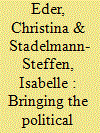

|
|
|
|
|
| Summary/Abstract |
Recently, social tipping dynamics relevant to sustainability have become the subject of a growing literature. Numerous publications seek to bring the concept of tipping (back) from the natural to the social system and make important contributions to its conceptualization, definition, and constant refinement. Yet, and despite its wide array, the current literature has a blind spot: it does neither adequately integrate, conceptualize, nor measure the role of the political sphere and thus underestimates its importance for social tipping processes. This is the starting point of our contribution, which not only emphasizes the political dimension's relevance to the analysis of social tipping, but also proposes two main ways to integrate it into such analyses: by conceptualizing the political sphere either as a trigger of social tipping, or as an element that can tip itself. Moreover, to capture the complexity of the political sphere, namely the interaction between networks, actors, and processes, we suggest analysing the political sphere along its three elements: polity, politics, and policy. We illustrate the empirical benefit of these refinements by presenting a comparative case study of the nuclear phase-out in Germany and Switzerland.
|
|
|
|
|
|
|
|
|
|
|
|
|
|
|
|
| 2 |
ID:
164351
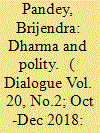

|
|
|
| 3 |
ID:
082406
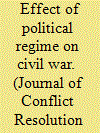

|
|
|
|
|
| Publication |
2008.
|
| Summary/Abstract |
Research published in the American Political Science Review shows that anocracies-as defined by the middle of the Polity index of political regime-are more susceptible to civil war than are either pure democracies or pure dictatorships. Yet, certain components of the Polity index include a factional category, where political competition is ``intense, hostile, and frequently violent. Extreme factionalism may be manifested in the establishment of rival governments and in civil war'' (Gurr 1989, 12). Not surprisingly, these components exhibit a strong relationship with civil war. When they are removed from the Polity index, however, the original relationship disappears. I conclude that the original finding is not driven by the relationship between political institutions and civil war but rather by a less provocative relationship between political violence and civil war.
|
|
|
|
|
|
|
|
|
|
|
|
|
|
|
|
| 4 |
ID:
142031
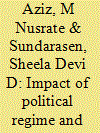

|
|
|
|
|
| Summary/Abstract |
Traditionally, researchers have investigated the effect of intrinsic variables such as labour, capital and human capital on economic growth. However, the positive effect of intrinsic variables is reversed by countervailing extrinsic variables such as corruption, armed conflict and political regime, which have not been examined much by existing literature. This study empirically examines the impact of intrinsic and extrinsic variables on economic growth. We apply several estimation techniques using a 2000–09 balanced panel data for ASEAN countries. The study finds that both intrinsic and extrinsic determinants of economic growth are significant. However, countervailing effects of extrinsic variables are documented for growth in ASEAN countries. Corruption and armed conflict have a statistically significant and negative relationship with economic growth in ASEAN countries, whilst political regime is found to be statistically insignificant.
|
|
|
|
|
|
|
|
|
|
|
|
|
|
|
|
| 5 |
ID:
072975
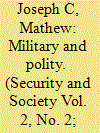

|
|
|
|
|
|
|
|